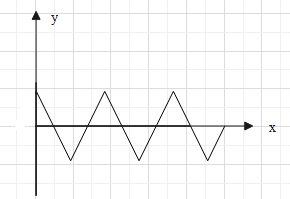Question
Question: The distance between 2\(^{nd}\) crest and 6\(^{th}\) trough of a wave shown below is 24cm. If the wa...
The distance between 2nd crest and 6th trough of a wave shown below is 24cm. If the wave velocity of the moving crest is 20ms−1, then frequency of rocking of the boat is

A. 24Hz
B. 20Hz
C. 375Hz
D. 240Hz
Solution
The distance two consecutive is equal to wavelength λ. Calculate the distance between 2nd crest and 6th trough in terms of the wavelength λ. Then use the formula v=fλ to find the frequency of the boat.
Formula used:
v=fλ
Complete step by step answer:
In a wave, the maximum amplitude is called crest and the minimum amplitude is called trough. The distance between two consecutive crests or two consecutive troughs is equal to the wavelength (λ) of the wave.
At the middle of the distance between two consecutive crests lies a tough. The distance between the two crests is λ. Therefore, the distance between crest and its successive trough is 2λ.
Therefore, distance between the 2nd crest and 6th crest will be 4λ and the distance between the 6th crest and the 6th will be λ. Hence, the total distance between the 2nd crest and 6th trough is 4λ+2λ=29λ.
And it is given that the distance between the 2nd crest and 6th trough is 24cm.
Therefore, 29λ=24cm
⇒λ=948=316cm=316×10−2m.
Since, the boat is oscillating on the wave, the frequency of the boat will be equal to the frequency of the wave. Therefore, let us find the frequency of the wave. For this, we will use the formula v=fλ….(i), where f is the frequency and v is the speed of the wave.
It is given that the speed of the crest is 20ms−1. Hence, the speed of the wave is 20ms−1.
⇒v=20ms−1
Substitute the values of λ and v in equation (i).
⇒20=f316×10−2
⇒f=1620×3×102=41500=375Hz
Therefore, the frequency of rocking of the boat is 375 Hz.
Hence, the correct answer is option C.
Note:
Sometimes, the question may ask to find the time period of oscillations. That time you may use the relation between time period and frequency of a wave. i.e. T=f1.
We can also write the time period (T) in terms of wavelength since f=λv.
Therefore, T=vλ.
